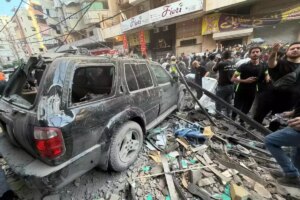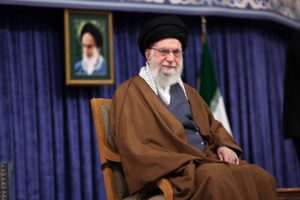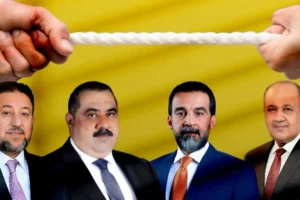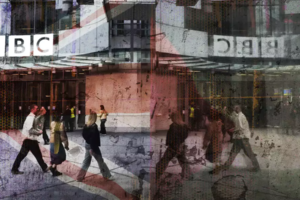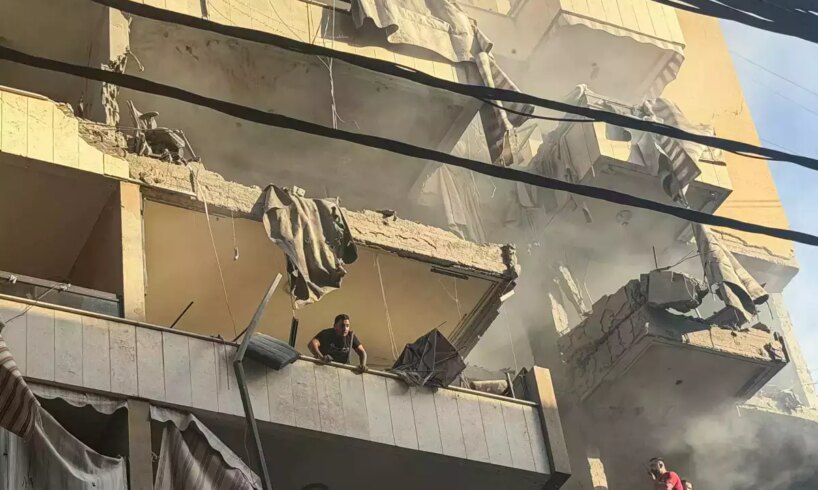
The surgical strike in Beirut’s Dahiyeh against Hezbollah’s chief of staff, Haytham ‘Ali Tabataba’i, is unmistakable proof of the pressure facing the terrorist organization. Since the elimination of most members of the Jihad Council, Hezbollah’s equivalent of a general staff, including the killing of Hassan Nasrallah and the top levels of the terrorist organization’s military command, Hezbollah has attempted to set in motion a period of regrowth and rebuilding.
As part of that process, the terrorist organization sought to calm its social base, which was severely harmed during the war and has signaled bitterness and fatigue. Given the base’s vital importance as Hezbollah’s source of manpower and electoral support, the terrorist organization pushed a narrative of victory and sacrifice. It also provided financial compensation, with Iranian assistance, to families whose homes were destroyed or who were forced to flee in fear of the war.
Ali Tabatabai against the background of the attack on Beirut. Photo: AFP
At the same time, Hezbollah launched an intensive reconstruction project, aided by smuggling from Iran and relying on local production capabilities. Since the end of the war, the terrorist organization has conducted an internal investigation to identify the sources of the leaks that enabled Israel’s deep penetration into its ranks. It has also begun a reorganization process to adapt to the new reality of its confrontation with Israel and has recruited new operatives.
For that reason, in an effort to emerge from the historic crisis caused by the war, Hezbollah’s leadership, headed by Secretary-General Naim Qassem, chose to contain Israel’s attacks, despite the resentment and unrest this policy generated among field commanders. Lebanon’s new political climate, including signs of a state revival and a desire to limit the consequences of the war to end Iranian domination in the country, also influenced the terrorist organization’s decision to adopt a containment strategy.
The killing of Tabataba’i comes at a moment when Hezbollah faces a complex equation. If the terrorist organization chooses to retaliate against Israel, it risks losing the gains it has achieved since the cease-fire and playing into the hands of Jerusalem, where leaders are eager to intensify Israeli strikes. On the other hand, failing to respond would project significant weakness, damage Hezbollah’s image in Lebanon, and could even spark early signs of internal rebellion within the organization.
Hezbollah flags against the backdrop of destruction in Lebanon. Photo: AFP AFP
It is also difficult to envision Tehran rushing to Hezbollah’s aid and reentering direct confrontation with Israel. In addition to its multiple domestic crises, including a crisis of legitimacy, water and energy shortages, and deep economic distress, Iran is now troubled by the decision of the International Atomic Energy Agency’s Board of Governors. The decision requires Iran to update the agency on its uranium stockpile and on the facilities struck during Operation Am Clavi. As occurred days before the start of the 12-day war, this could serve Israel as a tool to build legitimacy for renewing its campaign against Iran.
The Houthis, even if they join the confrontation alongside Hezbollah, cannot provide the necessary backing against Israel. Hamas and Islamic Jihad, given their current state, are also not interested in renewing fighting in the Gaza Strip. Hezbollah’s potential isolation on the battlefield will likely shape the organization’s decision regarding the scope of its response.
For these reasons, and particularly due to internal pressures within the terrorist organization, it appears Hezbollah will choose to engage in several limited days of fighting, if Tabataba’i was indeed killed. This would allow its field ranks to vent frustration and respond to Israel’s attacks. After absorbing the expected Israeli blow, Hezbollah will likely resume its reconstruction process.

